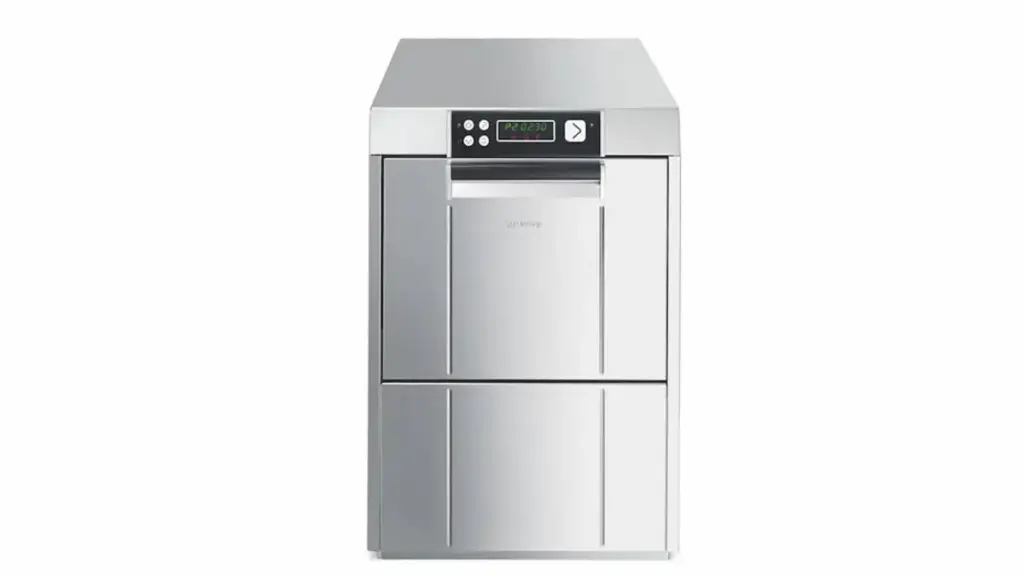Commercial dishwashers play a vital role in every busy restaurant, café, or catering company. These heavy-duty machines also have some disadvantages and are more complex than residential dishwashers.
This article will answer the most common questions food service owners ask when buying and installing a commercial dish washing machine in Australia.
We will cover the differences between home models, cost, types of machines and installation considerations. This guide will help you make a well-informed decision when choosing the best commercial dishwasher for your company.

What are the different types of commercial dishwashers?
Commercial dishwashers are generally divided into two types:
Conveyor Dishwashers
The dishwashers have a conveyor belt which transports the dish racks to different washing zones. These dishwashers are intended for high-volume operations such as large restaurants, casinos, and hotels.
Benefits:
- Wash hundreds of dishes in an hour.
- The assembly line style workflow is possible.
- Versatile for dishes, pots, pans, trays, etc.
- Suitable for continuous loads
Drawbacks:
- Need 3-phase electrical service
- Fixing the installation can be expensive
- Purchase and operating costs are high
- It can be too complex for small needs
Door-type Dishwashers
Also known as “stationary rack” dishwashers. Like a residential dishwasher, racks are loaded in the front of the machine and then washed. Ideal for small to mid-sized restaurants, cafes and bars.
Benefits
- Compact dimensions take up minimum space
- Purchase cost is lower than for conveyor models
- Simple controls and operation
- Many models are powered by 208/240V.
- Balance between speed and efficiency
Drawbacks
- Faster cycle time than conveyor models
- Reduced overall capacity
- Sequential batch operation
What’s the difference between commercial and home dishwashers?
Commercial and home dishwashers have several differences.
Size and capacity. Commercial dishwashers can wash more dishes in a single cycle. They have multiple racks, and can store the entire dishware of a restaurant. The capacity of a home dishwasher is limited to the dishes of a single family.
Durability – Commercial dishwasher machines are built to perform multiple cycles every day. These dishwashers are constructed of stainless steel with high-quality parts that can withstand constant use. The dishwashers in your home are designed to be run only 1-2 times a day.
Commercial washers have more power to wash dishes. They use stronger detergents and higher temperatures of water, as well as powerful spray jets. Dishwashers at home use a less intensive washing. Your Chef will appreciate having a commercial machine as they are faster and easier to load and unload.
Effectiveness of drying – Commercial dishwashers use powerful fans and ventilation system to completely dry the dishes. After a cycle, home dishwashers can leave moisture on the dishes.

What is the cost of installing a commercial dishwasher?
Installing a commercial dishwasher depends on many factors, including the brand, type, size, current setup and labor rates. Installing a commercial dish washing machine costs between $1,500 and $3,000.
The factors that influence the cost of installation are:
Cost of Dishwasher – the machine will make up the largest portion of your total project costs. Commercial dishwashers can start at around $1,500. Heavy-duty models cost up to $6,000 and more.
Plumbing – Installing the dishwasher’s water supply, drains and vents will require plumbing work. A plumber will charge between $500 and $1,000 for this work.
Electrical work – A dedicated circuit is required to run the motor and heating elements. An electrician’s labor will cost between $300 and $800.
Ventilation: A commercial dishwasher needs a powerful exhaust fan and ventilation duct work in order to remove the steam. Installing this adds between $500 and $1500 to the cost.
To prevent leaks, the dishwasher must be leveled and positioned. This labor should cost between $200 and $500.
What are the drawbacks of a commercial dish washing machine?
Commercial dishwashers are a necessity for restaurants with high traffic. However, they have some disadvantages.
- Costly upfront – The cost of a commercial dishwasher can be high, starting at $1,500 for the smallest models and going up to $10,000+ or more for larger models. Costs are pushed up by installation, plumbing and electrical work.
- Repairs are expensive – The parts and labor cost for a commercial dish washing machine is much higher than that of a domestic appliance. Repairs can cost up to $500+.
- Commercial washers use a lot of electricity, water, or gas to run sprayers and heaters. This results in high utility bills. You may also need to have your electrical switchboard panel upgraded to supply more power.
- Inefficient energy use – Older models are often very inefficient with electricity and water. The new ENERGY STAR rated dishwashers are better, but they still use more energy than a standard home dishwasher.
- Space is taken up – Commercial dishwashers can be very large and occupy valuable kitchen space which could be used to store food or prepare it.
- Noise – When running a cycle of washing, industrial washers can be quite loud. This can make it difficult to communicate.
Can I use an industrial dishwasher at home?
Installing a commercial-grade dishwasher at home is possible, but you should consider the following:
Electrical – Most homes do not have a 208-240V electrical circuit. The cost of converting the electrical system in your house will increase. Some models are powered by standard 120V.
Plumbing – Water pressure in residential water lines is lower than that of a commercial kitchen. It may be necessary to upgrade the lines in your home to run the dishwasher.
Venting – Commercial washers require powerful exhaust vents, which are not typically found in homes. Installation is crucial.
Noise level – A commercial dishwasher has a decibel rating that is much higher than a domestic model. It can cause disruption in a large open plan.
Can you use your residential dishwasher in a restaurant kitchen?
It is not recommended that a residential dishwasher be used in a commercial setting. Residential dishwashers were not built to handle the demands of a commercial kitchen. There are a few reasons why a dishwasher designed for residential use is not suitable for commercial use.
- Durability – Residential appliances are built for occasional use. They can be used 1-2 times per day. Commercial kitchens need to run their machines 20+ times per day. This will quickly wear out a home appliance.
- Capacity: Residential dishwashers can only handle dishes for a typical family dinner. They can’t handle the dish washing requirements of a restaurant.
- Water temperature – Residential washers are set at lower temperatures, which may not be sufficient to sanitize the dishes in commercial settings.
- The drying power of most residential dishwashers is insufficient. Commercial kitchens require dishes that are fully dried and immediately reusable.
- Residential washers do not have the power to clean commercial cookware and plates.
- Most jurisdictions prohibit the use of residential appliances in commercial establishments. Health codes prohibit the use of such appliances.
What is an integrated commercial dishwasher?
Just like a home integrated dishwasher, an integrated commercial dishwasher can be permanently installed into a kitchen counter or cabinetry. It is different from the freestanding commercial models which are installed outside existing cabinetry.
Choose an integrated commercial dishwasher for its many benefits:
- Seamless aesthetic – The dishwasher is seamlessly integrated into the cabinetry, giving it a seamless appearance. It gives a more refined, cleaner look than a large freestanding unit.
- The dishwasher can be integrated directly into the existing cabinet, saving valuable kitchen space. No need to purchase a separate standalone unit.
- The front controls and operation of an integrated unit make it more convenient for the kitchen staff. The workers don’t need to bend over or reach as far.
- Specialized sizes: Integrated models are available in 18″ widths to fit specific cabinet sizes. Freestanding units tend to be wider.
Summary
Installing the right type and size of commercial dishwasher in any food service business is a wise investment.
Commercial units may cost more initially, but their durability, cleaning power and capacity makes them essential for busy commercial kitchens and restaurants.
Consider your volume requirements, interior dimensions and utility requirements. Also, local codes should be considered. A commercial dishwasher can be installed strategically and with smart planning to provide efficient, reliable washing for many years.

